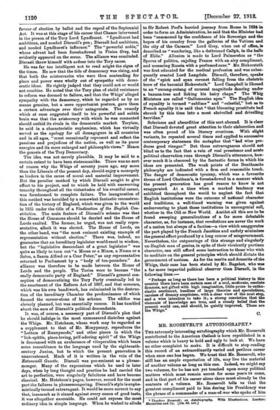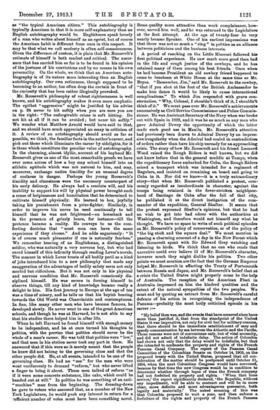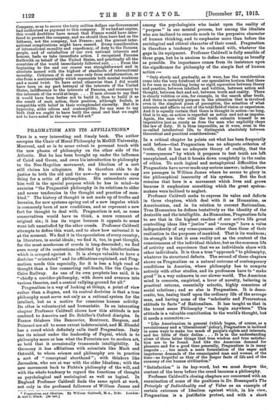MR. ROOSEVELT'S AUTOBIOGRAPHY.*
THE extremely interesting autobiography which Mr. Roosevelt contributed to the American Outlook is here republished in a volume which is heavy to hold and ugly to look at. We have no other complaint to make. It is difficult to stop reading this record of an extraordinarily varied and perilous career when once one has begun. We trust that Mr. Roosevelt, who still has an ample expectation of life, may live the material of another volume as long as this one. Indeed, we might say two volumes, for he has not yet touched upon many political matters which must remain secret for some years to come, and in that part of his career alone there must already be the contente of a volume. Mr. Roosevelt tells us that the greatest compliment paid to him during his Presidency was the phrase of a commander of a man-of-war who spoke of him • Theodore Roosevelt: an Autobiography. With Illustrations. London: Macmillan and Co. 1105. Gd. net.] as"the typical American citizen." This autobiography is typically American in that it is more self-explanatory than an English autobiography would be. Englishmen speak loosely of a man who writes about himself as an egoist, but of course the American habit is different from ours in this respect. It may be that what we call modesty is often self-consciousness. Given the difference of custom, it is plain that Mr. Roosevelt's estimate of himself is both modest and critical. The assur- ance that has carried him so far is to be found in his opinion of the justness of his convictions and by no means in his own personality. On the whole, we think that an American auto- biography is of its nature more interesting than an English autobiography. Our own reticences, though supposed to be becoming to an author, too often drop the curtain in front of the curiosity that has been rather illogically provoked.
Mr. Roosevelt's philosophy of robust righteousness is well known, and his autobiography makes it even more emphatic. The epithet "aggressive" might be justified by his advice on p. 94 never to bit softly when you are sure you are in the right: "The unforgivable crime is soft hitting. Do not hit at all if it can be avoided ; but never hit softly." We wonder what Matthew Arnold would have said to that, and we should have much appreciated an essay in criticism of it. A review of an autobiography should avoid as far as possible, we think, the familiar facts in the author's career, and pick out those which illuminate the career by sidelights, for it is these which constitute the peculiar value of autobiography. In the charming, almost idyllic, account of his boyhood Mr. Roosevelt gives us one of the most remarkable proofs we have ever come across of how a boy may school himself into an athletic aptitude which was not natural to him, and may, moreover, exchange native timidity for an unusual degree of coolness in danger. Perhaps the young Roosevelt's timidity and clumsiness were the necessary counterpart of his early delicacy. He always had a resolute will, and his inability to support his will by physical power brought such a sense of helplessness and humiliation that he determined to cultivate himself physically. He learned to box, joyfully taking his punishment from a prize-fighter. Similarly, in order to improve his nerve he used continually to tell himself that he was not frightened—on horseback and in the presence of grizzly bears, for instance—till the pretence became a reality. He conveys to us the com- forting doctrine that "most men can have the same experience if they choose." And he adds sagaciously : "It is of course much pleasanter if one is naturally fearless." We remember hearing of an Englishman, a distinguished soldier, who was naturally a very nervous boy, but who had cared himself of this infirmity through reading Lever's novels. The manner in which Lever treats of all bodily peril as a kind of joke introduced him to a new philosophy that made any exaggeration of the advantages of bodily safety seem not only morbid but ridiculous. But it was not only in his physical and nervous condition that Mr. Roosevelt consciously dis- ciplined himself. He was severe in forcing himself to observe things, till any kind of knowledge became really a delight to him. His first journey to Europe at the age of ten was a time of misery, and he tells us that his boyish bearing towards the Old World was Chauvinistic and contemptuous. In fine, like many other men who have become famous, he developed slowly. He never went to one of the great American schools, and though he was at Harvard, he is not able to say that his studies there helped him in after life.
When he left Harvard he found himself with enough money to be independent, and he at once turned his thoughts to politics, with the proviso that politics should never be the whole of a man's career. He was told that politics were "low," and that men in his station never took any part in them. He answered that if this were so it merely meant that the people he knew did not belong to the governing class and that the other people did. He, at all events, intended to be one of the governing class. He had no "use" for the men who were wont vociferously to demand "reform," but who never lifted a finger to bring it about. These men talked of reform "as if it were some concrete substance, like cake, which could be handed out at will." In politics he was something of an anti- " machine" man from the beginning. The dressing-down he gave to voters who assumed that, as a member of the New York Legislature, he would push any interest in return for a nifficient number of votes must have been something novel.
Some quality more attractive than weak complaisance, how- ever, served him well, and he was returned to the Legislature at the first attempt. At the age of twenty-four he very nearly became Speaker. One of his earliest impressions was that there was not so much a "ring" in politics as an alliance between politicians and the business interests.
A period of ranching on the Little Missouri followed hie first political experience. He saw much more good than bad in the life and rough justice of the cowboys, and he has retained many of them among his best friends. Once when he had become President an old cowboy friend happened to come to luncheon at White House at the same time as Mr.
Bryce. "Remember, Jim," said Mr. Roosevelt to the cowboy, "that if you shot at the feet of the British Ambassador to make him dance it would be likely to cause international complications." To which Jim responded with grave con-
sternation, "Why, Colonel, I shouldn't think of it, I shouldn't think of it." We must pass over Mr. Roosevelt's achievements
successively as Civil Service Commissioner and Police Commis- sioner. He was Assistant Secretary of the Navy when war broke out with Spain in 1898, and it was he as much as any man who gave Admiral Dewey the opportunity of which the latter made such good use in Manila. Mr. Roosevelt's attention had previously been drawn to Admiral Dewey by an inipres- sive irregularity when the Admiral had coaled in contradiction of orders rather than have his ship unready for an approaching crisis. The story of how Mr. Roosevelt and his friend Leonard Wood raised the Rough Riders is well known, but we did not know before that in the general muddle at Tampa, when the expeditionary force embarked for Cuba, the Rough Riders
seized a transport which was intended for a regiment of Regulars, and insisted on remaining on board and going to Cuba in it. Nor did we know—it is a truly extraordinary story—that when Mr. Roosevelt published a protest, com- monly regarded as insubordinate in °hesitater, against the
troops being retained in the fever-stricken neighbour- hood of Santiago de Cuba after the fall of that city, he published it at the direct instigation of the com- mander of the expedition, General Shelter. It seems that the protest expressed Shafter's opinions, but that he had no wish to get into bad odour with the authorities at Washington, and therefore would not himself say what he thought. We have no space to write of such political episodes as Mr. Roosevelt's policy of conservation, or of the policy of "the big stick and the square deal." We must mention in passing a charming account of a day in the New Forest which Mr. Roosevelt spent with Sir Edward Grey watching and listening to birds. We think that no one who reads that narrative could ever believe ill of Mr. Roosevelt's character, however much they might dislike his politics. Two other points we must mention are the fact that the German Emperor helped Mr. Roosevelt in effecting the Treaty of Portsmouth between Russia and Japan, and Mr. Roosevelt's belief that at a crisis the United States might properly come to the help of Australia. The reception of the American Fleet in Australia impressed on him the kindred qualities and the extent of the natural sympathies of the two peoples. We must end by quoting an extract from Mr. Roosevelt's careful defence of his action in recognizing the independence of Panama—probably the most hotly criticized episode in his career :-
"My belief then was, and the events that have occurred since have more than justified it, that from the standpoint of the United States it was imperative, not only for civil but for military reasons, that there should be the immediate establishment of easy and speedy communication by sea between the Atlantic and the Pacific. These reasons were not of convenience only, but of vital necessity, and did not admit of indefinite delay. The action of Colombia had shown not only that the delay would be indefinite, but that she intended to confiscate the property and rights of the French Panama Canal Company. The report of the Panama Canal Committee of the Colombian Senate on October 14, 1903, on the proposed treaty with the United States, proposed that all con- sideration of the matter should be postponed until October 31, 1904, when the next Colombian Congress would have convened, because by that time the new Congress would be in condition to determine whether through lapse of time the French company had not forfeited its property and rights. 'When that time arrives,' the report significantly declared, 'the Republic, without any impediment, will be able to contract and will be in more clear, more definite and more advantageous possession, both legally and materially.' The naked meaning of this was that Colombia proposed to wait a year, and then enforce a forfeiture of the rights and property of the French Panama
Company, so as to secure the forty million dollars our Government had authorized as payment to this company. If we had sat supine, this would doubtless have meant that France would have inter- fered to protect the company, and we should then have had on the Isthmus, not the company, but France ; and the gravest inter- national complications might have ensued. Every consideration of international morality and expediency, of duty to the Panama people, and of satisfaction of our own national interests and honour, bade us take immediate action. I recognized Panama forthwith on behalf of the United States, and practically all the countries of the world immediately followed suit. . . . From the beginning to the end our course was straightforward and in absolute accord with the highest of standards of international morality. Criticism of it can come only from misinformation, or else from a sentimentality which represents both mental weakness and a moral twist. To have acted otherwise than I did would have been on my part betrayal of the interests of the 'United States, indifference to the interests of Panama, and recreancy to the interests of the world at large. . . . If men choose to say that it would have been better not to build it, than to build it as the result of such action, their position, although foolish, is compatible with belief in their wrongheaded sincerity. But it is hypocrisy, alike odious and contemptible, for any man to say both that we ought to have built the canal and that we ought not to have acted in the way we did act."




































 Previous page
Previous page